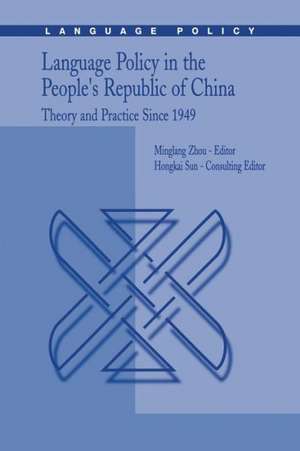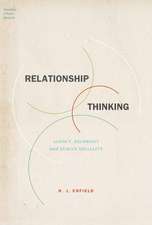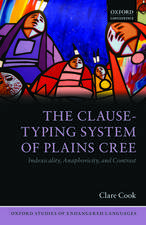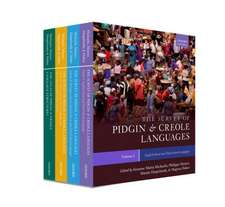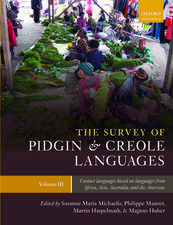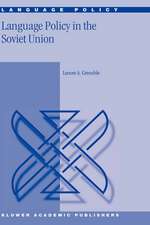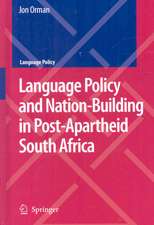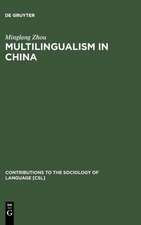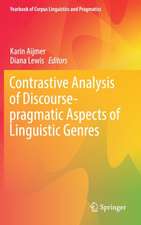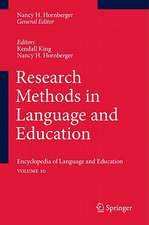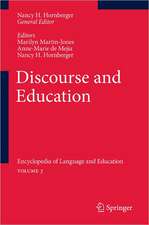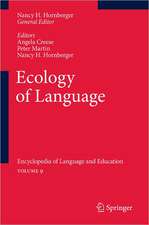Language Policy in the People’s Republic of China: Theory and Practice Since 1949: Language Policy, cartea 4
Editat de Minglang Zhou, Hongkai Sunen Limba Engleză Paperback – 3 oct 2013
The contributors of this volume provide the first comprehensive scrutiny of this sweeping linguistic revolution from three unique perspectives. First, outside scholars critically question the parities between constitutional rights and actual practices and between policies and outcomes. Second, inside policy practitioners review their own project involvements and inside politics, pondering over missteps, undergoing soul-searching, and theorizing their personal experiences. Third, scholars of minority origin give inside views of policy implementations and challenges in their home communities. The volume sheds light on the complexity of language policy making and implementing as well as on the politics and ideology of language in contemporary China.
| Toate formatele și edițiile | Preț | Express |
|---|---|---|
| Paperback (1) | 947.85 lei 6-8 săpt. | |
| SPRINGER NETHERLANDS – 3 oct 2013 | 947.85 lei 6-8 săpt. | |
| Hardback (1) | 953.97 lei 6-8 săpt. | |
| SPRINGER NETHERLANDS – 16 sep 2004 | 953.97 lei 6-8 săpt. |
Din seria Language Policy
- 24%
 Preț: 804.41 lei
Preț: 804.41 lei - 18%
 Preț: 885.63 lei
Preț: 885.63 lei - 18%
 Preț: 1009.08 lei
Preț: 1009.08 lei - 24%
 Preț: 776.31 lei
Preț: 776.31 lei - 18%
 Preț: 775.30 lei
Preț: 775.30 lei - 15%
 Preț: 641.71 lei
Preț: 641.71 lei - 15%
 Preț: 634.32 lei
Preț: 634.32 lei - 18%
 Preț: 740.25 lei
Preț: 740.25 lei - 15%
 Preț: 643.16 lei
Preț: 643.16 lei - 15%
 Preț: 642.68 lei
Preț: 642.68 lei - 18%
 Preț: 1118.75 lei
Preț: 1118.75 lei - 24%
 Preț: 753.11 lei
Preț: 753.11 lei - 15%
 Preț: 647.40 lei
Preț: 647.40 lei - 18%
 Preț: 785.42 lei
Preț: 785.42 lei - 18%
 Preț: 949.23 lei
Preț: 949.23 lei - 18%
 Preț: 895.58 lei
Preț: 895.58 lei - 15%
 Preț: 645.47 lei
Preț: 645.47 lei - 24%
 Preț: 689.39 lei
Preț: 689.39 lei - 15%
 Preț: 642.83 lei
Preț: 642.83 lei - 15%
 Preț: 648.89 lei
Preț: 648.89 lei - 15%
 Preț: 635.80 lei
Preț: 635.80 lei - 15%
 Preț: 634.32 lei
Preț: 634.32 lei -
 Preț: 389.70 lei
Preț: 389.70 lei - 18%
 Preț: 1106.79 lei
Preț: 1106.79 lei - 24%
 Preț: 787.79 lei
Preț: 787.79 lei - 18%
 Preț: 1111.97 lei
Preț: 1111.97 lei - 24%
 Preț: 738.97 lei
Preț: 738.97 lei - 15%
 Preț: 700.29 lei
Preț: 700.29 lei - 18%
 Preț: 895.27 lei
Preț: 895.27 lei - 18%
 Preț: 889.60 lei
Preț: 889.60 lei - 18%
 Preț: 953.97 lei
Preț: 953.97 lei
Preț: 947.85 lei
Preț vechi: 1155.91 lei
-18% Nou
Puncte Express: 1422
Preț estimativ în valută:
181.38€ • 193.95$ • 151.22£
181.38€ • 193.95$ • 151.22£
Carte tipărită la comandă
Livrare economică 17 aprilie-01 mai
Preluare comenzi: 021 569.72.76
Specificații
ISBN-13: 9789401740326
ISBN-10: 9401740321
Pagini: 368
Ilustrații: XIX, 345 p.
Dimensiuni: 155 x 235 x 19 mm
Greutate: 0.51 kg
Ediția:Softcover reprint of the original 1st ed. 2004
Editura: SPRINGER NETHERLANDS
Colecția Springer
Seria Language Policy
Locul publicării:Dordrecht, Netherlands
ISBN-10: 9401740321
Pagini: 368
Ilustrații: XIX, 345 p.
Dimensiuni: 155 x 235 x 19 mm
Greutate: 0.51 kg
Ediția:Softcover reprint of the original 1st ed. 2004
Editura: SPRINGER NETHERLANDS
Colecția Springer
Seria Language Policy
Locul publicării:Dordrecht, Netherlands
Public țintă
ResearchCuprins
Introduction: The Context of the Theory and Practice of China’s Language Policy.- Introduction: The Context of the Theory and Practice of China’s Language Policy.- Theory and Practice in the Center.- Fifty Years of Script and Written Language Reform in the P.R.C..- The Relationship between Putonghua and Chinese Dialects.- The Creation of Writing Systems and Nation Establishment.- Minority Language Policy in China.- The Center Versus The Periphery in Practice.- Language Spread Versus Language Maintenance: Policy Making and Implementation Process.- Good to Hear.- Putonghua Education and Language Policy in Postcolonial Hong Kong.- On the Promotion of Putonghua in China: How a Standard Language Becomes a Vernacular.- Theorizing Personal Experiences from the Practice.- Theorizing Over 40 Years Personal Experiences with the Creation and Development of Minority Writing Systems of China.- The Use and Development of Dai and its Vernacular Writing Systems.- Theory and Practice Viewed from Minority Communities.- The Use and Development of Tibetan in China.- The Introduction and Development of the Zhuang Writing System.- Policies on the Planning and Use of the Yi Language and Writing Systems.- Language Policy for Bai.- The Use and Development of Mongol and its Writing Systems in China.- Language Policy and Standardization of Korean in China.- Foreign Language Education Policy and Modernization.- Foreign Language Education in the PRC.- Postscript.- Language Matters in China: An Anthropological Postscript.
Recenzii
From the reviews:
"This volume tries to give an overview of ‘the dramatic linguistic revolution that has swept across China’ during the second half of the twentieth century. … In the 19 papers which this book presents, the reader is made well aware of the enormous complexities involved in language-planning in a country with more than 1.3 billion inhabitants. … This quite detailed and scholarly study can be read by anyone with a deeper interest in Chinese culture, language, society." (E. Van Laerhoven, Acta Comparanda, Vol. XVI, 2005)
"This volume tries to give an overview of ‘the dramatic linguistic revolution that has swept across China’ during the second half of the twentieth century. … In the 19 papers which this book presents, the reader is made well aware of the enormous complexities involved in language-planning in a country with more than 1.3 billion inhabitants. … This quite detailed and scholarly study can be read by anyone with a deeper interest in Chinese culture, language, society." (E. Van Laerhoven, Acta Comparanda, Vol. XVI, 2005)
Textul de pe ultima copertă
Language matters in China. It is about power, identity, opportunities, and, above all, passion and nationalism. During the past five decades China’s language engineering projects transformed its linguistic landscape, affecting over one billion people’s lives, including both the majority and minority populations. The Han majority have been juggling between their home vernaculars and the official speech, Putonghua – a speech of no native speakers – and reading their way through a labyrinth of the traditional, simplified, and Pinyin (Roman) scripts. Moreover, the various minority groups have been struggling between their native languages and Chinese, maintaining the former for their heritages and identities and learning the latter for quality education and socioeconomic advancement.
The contributors of this volume provide the first comprehensive scrutiny of this sweeping linguistic revolution from three unique perspectives. First, outside scholars critically question the parities between constitutional rights and actual practices and between policies and outcomes. Second, inside policy practitioners review their own project involvements and inside politics, pondering over missteps, undergoing soul-searching, and theorizing their personal experiences. Third, scholars of minority origin give inside views of policy implementations and challenges in their home communities. The volume sheds light on the complexity of language policy making and implementing as well as on the politics and ideology of language in contemporary China.
The contributors of this volume provide the first comprehensive scrutiny of this sweeping linguistic revolution from three unique perspectives. First, outside scholars critically question the parities between constitutional rights and actual practices and between policies and outcomes. Second, inside policy practitioners review their own project involvements and inside politics, pondering over missteps, undergoing soul-searching, and theorizing their personal experiences. Third, scholars of minority origin give inside views of policy implementations and challenges in their home communities. The volume sheds light on the complexity of language policy making and implementing as well as on the politics and ideology of language in contemporary China.
Caracteristici
The contributors of this volume provide the first comprehensive scrutiny of this sweeping linguistic revolution from three unique perspectives. First, outside scholars critically question the parities between constitutional rights and actual practices and between policies and outcomes. Second, inside policy practitioners review their own project involvements and inside politics, pondering over missteps, undergoing soul-searching, and theorizing their personal experiences. Third, scholars of minority origin give inside views of policy implementations and challenges in their home communities. The volume sheds light on the complexity of language policy making and implementing as well as on the politics and ideology of language in contemporary China.
